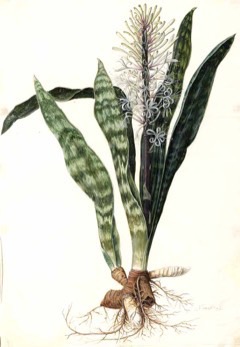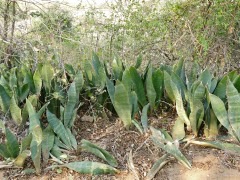 |
|
edibleplants.org |
 |
| Wikimedia.org - Bernard DUPONT from FRANCE |
Translate this page:
Summary
Physical Characteristics

 Sansevieria is an evergreen Perennial growing to 0.5 m (1ft 8in) by 0.1 m (0ft 4in) at a fast rate.
Sansevieria is an evergreen Perennial growing to 0.5 m (1ft 8in) by 0.1 m (0ft 4in) at a fast rate.
See above for USDA hardiness. It is hardy to UK zone 10.
It is noted for attracting wildlife.
Suitable for: light (sandy) and medium (loamy) soils, prefers well-drained soil and can grow in nutritionally poor soil. Suitable pH: neutral and basic (mildly alkaline) soils. It can grow in semi-shade (light woodland) or no shade. It prefers dry or moist soil and can tolerate drought.
UK Hardiness Map
US Hardiness Map
Synonyms
Acyntha guineensis (L.) Medik. Acyntha thyrsiflora (Thunb.) Kuntze Aletris guineensis (L.) Jacq. Aletris hyacinthoides (L.) L. Aloe guineensis (L.) Jacq. Aloe hyacinthoides L. Cordyline guineensis (L.) Britton Cordyline hyacinthoides (L.) W.Wight Pleomele aloifolia Salisb. Salmia guineensis (L.) Cav. Salmia spicata Cav. Sanseverinia thyrsiflora Petagna Sansevieria angustiflora Lindb. Sansevieria angustifolia Baker Sansevieria ceylonica Oken Sansevieria fulvocincta Haw. Sansevieria guineensis (L.) Willd. Sansevieria laetevirens Haw. Sansevieria latifolia Bojer Sansevieria polyphylla Haw. Sansevieria rufocincta Baker Sansevieria spicata (Cav.) Haw. Sansevieria stenophylla Link Sansevieria thyrsiflora (Petagna) Thunb. Veltheimia guineensis (L.) Neck.
Plant Habitats
Edible Uses
References More on Edible Uses
Medicinal Uses
Plants For A Future can not take any responsibility for any adverse effects from the use of plants. Always seek advice from a professional before using a plant medicinally.
A decoction of the rootstock is used as a treatment against internal parasites[46 ]. The plant is used as a treatment for fevers, toothache, ear affections and haemorrhoids[317 ]. The leaves contain steroidal compounds.[317 ].
References More on Medicinal Uses
The Bookshop: Edible Plant Books
Our Latest books on Perennial Plants For Food Forests and Permaculture Gardens in paperback or digital formats.

Edible Tropical Plants
Food Forest Plants for Hotter Conditions: 250+ Plants For Tropical Food Forests & Permaculture Gardens.
More

Edible Temperate Plants
Plants for Your Food Forest: 500 Plants for Temperate Food Forests & Permaculture Gardens.
More

More Books
PFAF have eight books available in paperback and digital formats. Browse the shop for more information.
Shop Now
Other Uses
A good quality fibre is obtained from the leaves[317 , 454 ]. An excellent, soft, silky and elastic fibre[459 ]. It is used for making clothes, nets, string, mats and for the production of fine papers etc[317 , 418 ]. Attracts butteflies and birds. Good for pots and indoors. Industrial Crop: Fiber.
Special Uses
References More on Other Uses
Cultivation details
A plant of the tropics. It grows best in areas where annual daytime temperatures are within the range 20 - 30°c, but can tolerate 15 - 36°c[418 ]. It prefers a mean annual rainfall in the range 700 - 1,400mm, but tolerates 500 - 2,000mm[418 ]. Requires a sunny position in a well-drained soil[200 ]. Succeeds in most soils[418 ]. Prefers a pH in the range 6.5 - 7.5, tolerating 6 - 8[418 ]. Established plants are very drought tolerant[200 ]. The plant can spread freely at the roots. It is considered an invasive weed in Florida[423 ]. Fibre yields of up to 2.25 tonnes per hectare per year have been recorded[418 ].
References Carbon Farming Information and Carbon Sequestration Information
Temperature Converter
Type a value in the Celsius field to convert the value to Fahrenheit:
Fahrenheit:
The PFAF Bookshop
Plants For A Future have a number of books available in paperback and digital form. Book titles include Edible Plants, Edible Perennials, Edible Trees,Edible Shrubs, Woodland Gardening, and Temperate Food Forest Plants. Our new book is Food Forest Plants For Hotter Conditions (Tropical and Sub-Tropical).
Shop Now
Plant Propagation
Seed - Division of the rootstock. Leaf cuttings. Cut the leaf into sections about 5cm long, place in a 2:1 mix of sand and peat in a propagating case with a bottom heat of 18°c[200 ].
Other Names
If available other names are mentioned here
Common Names: English: bowstring hemp; iguanatail; mother-in-law’s tongue; snake plant. Spanish: lengua de suegra; lengua de vaca. Local Common Names: Dominican Republic: Espada de Santa Elena; Espada de Santa Teresa; Hoja de Santa Elena. Haiti: oreilles d’ane; safran; z’oreilles bourrique. Lesser Antilles: bowstring; karata; langue a chat; lash; sanddragon de cermitiere; z’oreille a bourrique. Mozambique: tchikwenga. Puerto Rico: chucho; cocuisa; lengua de chuco; sansiviera. Saint Lucia: lanng bèlmè; mother-in-law's-tongue.
Native Range
AFRICA: Tanzania, Mozambique, Malawi, Zambia, Zimbabwe, Eswatini, South Africa (Eastern Cape, Gauteng, KwaZulu-Natal, Limpopo, Mpumalanga)
Weed Potential
Right plant wrong place. We are currently updating this section.
Please note that a plant may be invasive in one area but may not in your area so it's worth checking.
It is considered an invasive weed in Florida[423 ]. Included in the Global Compendium of Weeds (Randall, 2012).
Conservation Status
IUCN Red List of Threatened Plants Status : Least Concern ver 3.1

Growth: S = slow M = medium F = fast. Soil: L = light (sandy) M = medium H = heavy (clay). pH: A = acid N = neutral B = basic (alkaline). Shade: F = full shade S = semi-shade N = no shade. Moisture: D = dry M = Moist We = wet Wa = water.
Now available:
Food Forest Plants for Mediterranean Conditions
350+ Perennial Plants For Mediterranean and Drier Food Forests and Permaculture Gardens.
[Paperback and eBook]
This is the third in Plants For A Future's series of plant guides for food forests tailored to
specific climate zones. Following volumes on temperate and tropical ecosystems, this book focuses
on species suited to Mediterranean conditions—regions with hot, dry summers and cool, wet winters,
often facing the added challenge of climate change.
Read More
Expert comment
Author
(L.) Druce
Botanical References
Links / References
For a list of references used on this page please go here
A special thanks to Ken Fern for some of the information used on this page.
Readers comment
| Add a comment |
|
If you have important information about this plant that may help other users please add a comment or link below. Only comments or links that are felt to be directly relevant to a plant will be included. If you think a comment/link or information contained on this page is inaccurate or misleading we would welcome your feedback at [email protected]. If you have questions about a plant please use the Forum on this website as we do not have the resources to answer questions ourselves.
* Please note: the comments by website users are not necessarily those held by PFAF and may give misleading or inaccurate information.
To leave a comment please Register or login here All comments need to be approved so will not appear immediately.
|
|